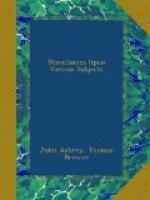Anne Hinde.
Capt. 10. die Septembris 1690.
By me
W. Mauleverer.
Un. Coron, Commit, praedict.
The examination of Edward Mangall, upon the murder of Elizabeth Johnson alias Ringrose, taken before me William Mauleverer, Gent, one of the Coroners of our Sovereign Lord and Lady King William and Queen Mary, &c.
The said Edward Mangall did confess, that he did murder the said Elizabeth Johnson alias Ringrose, upon the fourth day of September instant, in a close nigh to King’s Causey, he being asked the reason, said the Devil put him upon it, appearing to him in a flash of lightning; but denied that he medled with William Johnson alias Ringrose, the child.
Taken the 10th of Sept. 1690,
By me
W. Mauleverer, Coroner.
VOICES.
“Saepe etiam & in praeliis Fauni auditi, & in rebus turbidis veridicae voces ex occulto missae esse dicuntur. Cujus generis duo sunt ex multis exempla, sed maxima. Nam non multo ante Urbem captam exaudita vox est a Luco Vestae, qui a Palatii radice in novem viam devexus est, ut muri & portae reficerentur: futurum esse, nisi provisum esset, ut Roma caperetur. Quod neglectum cum caveri poterat, post acceptam illam maximam cladem explicatum est. Ara enim Aio loquenti, quam septam videmus, & adversus eum locum consecrata est.”
i. e. Often even in battles have the Gods of the woods been heard to speak, and in troublesome times, when the affairs of governments have gone wrong, and been in disorder and turmoil, voices have been known to steal upon the ears of persons, that came as it were from a corner, but they knew not whence, and told them important truths. Of which kind there are out of a great many, two examples, and those indeed very rare and extraordinary. For not long before the city was taken, a voice was heard from the grove of Vesta, which went from the foot, and basis of the palace, sloping and bending into a new road, that the city walls and gates should be repaired: and that unless care was taken of it, the consequence would be, that Rome would be taken. This being omitted, when provision might have been made, was explained after that most signal and dreadful overthrow. For the altar, which we see enclosed, and that fronts that place, was a consecrated altar.
“—– Negue solum deorum voces Pythagorei observaverunt, sed etiam hominum, quae vacant omina —– .”
i. e. Neither did the Pythagorean Philosophers observe the voices of Gods only, but also those of men, which they called Omens.
“Nero —– & lo’n dit qu’on entendoit un son de trumpette dans les collines d’alentour, des gemissemens sur le tombeau de sa mere.”
Nero, they say, heard the sound of a trumpet among the hills and the rocks round about him, and groans over the tomb of his mother.
In the life of King Henry IV. of France, written by the Arch-Bishop of Paris, it is recorded, that Charles IX. (who caused the massacre) was wont to hear screaches, like those of the persons massacred.




